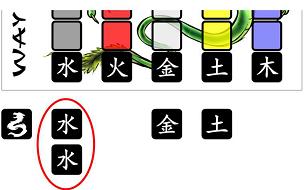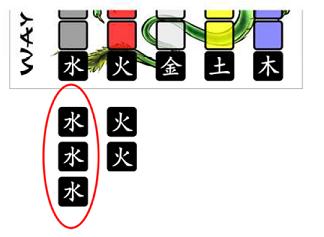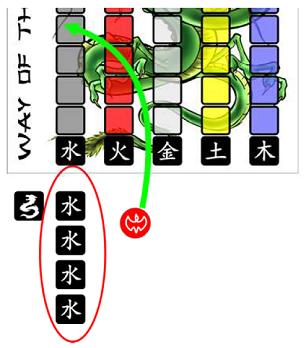INTRODUCTION
This is the ultimate race between the five elements. The
earth dragons, the water tortoises, the metal tigers, the fire
birds and the wood dragons cross the way of the Great
Celestial Dragon to gain immortality.
The goal of the game is to get your five pieces as far as
possible through the five paths when the game ends. This
happens when at least one of the players has reached the end
of the five paths.
COMPONENTS
A “Way of the Dragon” set includes:
SETUP
Place the board in the middle of the playing surface.
Each player selects a color and picks all the pieces of that
colour (5 animals and one counter). The players place their
counters in front of them to indicate their colours.
Upon agreement, the players may place some non-playing
animals randomly onto the board spaces (except onto the ones
with the symbols or numbers). These are “dead” pieces, they
are not moved during the game, but they block the movement
of the playing pieces. No space can contain more than 1 piece.
In the basic game no special powers are used. See
“Special powers” at the end of this rulebook if you want to play
the advanced game.
HOW TO PLAY
The player that lost the previous game starts. In case of
being the first game each player rolls the 5 dice. The player that
rolled the most dragons starts. In case of a tie, the tied players
re-roll.
The players take turns in anticlockwise order. On your turn
you must do the following in order.
1. Roll the five dice. You may elect to roll a second and
third time re-rolling any or all of dice (as in Yahtzee).
2. If you can, you must move one of your pieces, except if
you’ve called the great dragon (see below “Calling the dragon”).
Then the turn passes to the next player.
Once you’ve finished your dice rolls, you must choose one
of the elements and advance the piece on the corresponding
path as many spaces as dice are showing this element. If there
is no piece of your color on the corresponding path, you must
enter a piece from outside the board onto the symbol space of
the path and then move it the full number of spaces (pieces
never stay on the symbol spaces). There cannot be more than
one piece of each colour on each path, so there is one path for
every piece the player has.
If the destination space is occupied by another piece, the
player’s piece cannot be moved at all (nor can it be entered
onto the board) this turn.
A piece lying on a numbered space can no longer move,
but can be swapped by calling the Great Dragon (see below).
Moving is mandatory. This is, if the player can move at
least one piece, he must move one.
If the player cannot move any of his pieces then simply
passes the turn.

|
The red player rolls the 5 dice…
…and gets one “dragon, 2 “water”, one “metal” and one “earth”.
He decides to keep 2 “water”, and rolls the other 3…
|

|
… and gets another “water” and 2 “fire”. He rolls the 2 “fire” again…
|

|
… and gets a 4th “water” and a dragon.
Then he enters one of his pieces onto the board, on the 4th “water” square.
|
If a player has rolled 4 or 5 dragons, the he may call the
Great Dragon instead of moving. The Great Dragon has the
power to swap 2 pieces of one of the paths.
- If the player has rolled 4 dragons, he is allowed to
swap any two pieces of the corresponding path of the element
shown on the 5th die.
- If he’s rolled 5 dragons, he is allowed to swap any 2
pieces on any one path.
If all the 5 dice show the same element (not dragons), then
he’s reached ‘perfection’ and may play a complete turn again
after moving.
If all the 5 dice show a different element (not dragons),
then he’s reached ‘equilibrium’ and he must move each of his
pieces forward one space (those that can be moved).
GAME END
The game ends when one player has all of his pieces on
numbered spaces.
Then each player sums up the numbers underneath their
pieces. The player with the highest score wins the game. In
case of a tie, the player with most pieces on numbered spaces
wins the game. If the tie persists then the game is a tie.
ADVANCED PLAY
In the advanced game, each element has a special
power. Each player can use his power only once during the
game. To indicate that he’s used his power, the player must
discard his counter .
- Black tortoise (water): Fear. The player may elect not
to move any of his pieces, even if he’s forced to.
- Red bird (fire): Re-birth. The player has an extra turn.
- White tiger (metal): Eye of the tiger. The player may
roll a 4th time.
- Blue dragon (wood): The dragon. The player can use
the rolled dragons as a substitute for any other element.
- Yellow dragon (earth): Anxiety. If the destination
space is occupied, the yellow dragon can jump over the
blocking piece/s to the next empty space. This works for
“equilibrium” too.
VARIANT - IMMUNITY
Each piece is immune to the Great Dragon when it is on
the path of the same color. For example, the black tortoise is
immune to the Great Dragon in the first path (water).